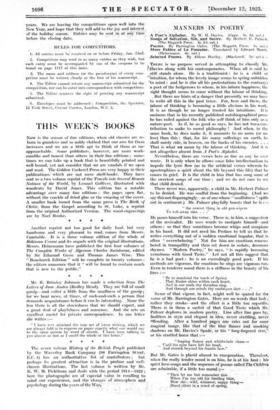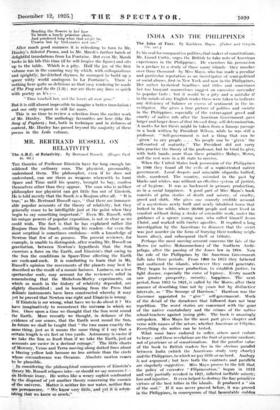MANNERS IN -POETRY
'.A Poet's Alphabet. By W. H. Davies. (Cape. 3s. fid. net.)
More Fables of La FOntalne. Translated- Edward Marsh.
(Heinemann. Os. net.) •
Selected Poems. By Aldous 1-tusl'ey. (Blackwell; '7is.t-net:,) THERE is no purpose served in attempting to classify Mr. Pfiavies along with h4 ,contemporaries. When all is said he still stands alone. • He is a traditionist : he is a child of iliatuitiOn, for whom the lovely linage. seems to spring unbidden to mind : and he is (for' all his protestationS to the contrary) a poet of the hedgerows to whom, in his inborn happiness, the
right thought seems to come without the labour of thinking. But there are hints of a danger- that presently we may have to write all this in the past tense. For, here and there, the labour of thinking is becoming a little obvious in his work. It is as though he no longer trusted his intuitions. It is
ominous that in his recently published autobiographical prose he has railed against the folk who will think of him only as a nature-poet. As if, he as good as says, he has not too a con- tribution to make to moral philosophy ! And when, in the
same book, he does Make it, it amounts to no more (or no less) than this : that, for his many sufferings on earth, he
shall surely ride, in heaven, on the backs of his enemies. . . That is what we mean by the labour of thinking. And it is not altogether absent from A Poet's Alphabet.
Nevertheless, there are verses here as fine as any he ever wrote. It is only when he allows some false-intellectualism to
impede the lyric flow (as in the artificial verses wherein he apostrophizes a spirit about the life beyond this life) that he comes to grief. It is the child in him that has sung some of the sweetest songs of our time ; and we do not care to see
thatehild denied. , .
_ There never was, apparently, a child in Mr. Herbert Pahner to be denied. He was soulful -from the beginning.- (And we . say this not disparagingly—as of one whose " soulfulness " spills out in sentiment.) Mr. Palmer playfully boasts that he is "the newest_ thing in old pen-wipers To rub away sins. . . ."
IIe pours himself into his verse. There is, in him, a suggestion of the revivalist. - He uses words to castigate himself—and - others ; so. that_ they sometimes -.become whips 'and scorpions in his hand. It did not need his Preface.to-tell us that lie
writes everything out of a sudden emotional impulse, that is often " overwhelming." Not for him are emotions remem-:
bored in tranquillity and then set down in sedate,- decOrouS - rhymes. " Modern Poetry," he says, is rapidly becoming . verminous with Good Taste." - Let not all this suggest that he is a bad poet : he is an exceedingly good poet. If his methods are vigorous, the emotions he sings are vigorous too: v.
Even in tenderer mood there is a stiffness in the beauty of his lines
. " Be to mankind the torch-of Spring
• . .That EaSter shine within each heart, And in our souls thy thrushes sing, . And through our minds thy sunbeams dart . . ."
Some of that vigour, in fact, might well be spared for the
verse of Mr. Barrington Gates. Here are words that lash-: rather they stroke—and the effect is a little too soporifie'.1
There is in them a surfeit of that Good Taste which Mr.?
Palmer deplores in 'modern . odepi poetry. Line after line goes by, faultless in style and elegant in idea, never startling, nev=er; Tending. After a hundred. pages. one cries out for son-kr; Magical image, like that of 'the. hlkie- flames arid smoking;
shadows on Mr. Davies's Spade, or his " long-fingered star," or his startled horse that " leaping flames and whirlwinds chase- . Until his eyes have left his head, - 4nd stretch beyond his frantic face."
But Mr. Gates is placid almost to exasperation. Therefore;' when the really tender mood is on him, he is at his best : his quiet love-songs and the sequence of poems called The Children
are admirable, if a little too moral-J-- _
" Then let me but-reinembef this - - When I'm too -old:for firstling bliss,
:How winsome, sappy thing- _ _Stoodsilent wood of spring, . •
Bending the:flowers in her face TO brush a lonely primrose-place, -
And pondered long what that might be,
Unseen but by. Lunt:mates and me."
After much good manners it is refreshing to turn to Mr. Hiiiley's Selected Poems, and to Mr: Marsh's further batch of delightful translations from La Fontaine. But even Mr. Marsh .; tucks in his bib this time (if he will forgive the figure) and sits up to the table. Which is a pity. Half the joy of the first volume was in the cunning way by which, with colloquialisms and sPrightly-, far-fetched rhymes, he managed to build up a " queer witty world -analogous- to La Fontaine's. There is ' nothing here quite so aclicionS as•that easy rendering he made of The Frog and the Ox (1.3) ; nor are there any lines so quick
with poetry as ifs „_ • " Time touched her, and the lovers all were gone."
But it is still almost impossible to imagine a better translation ; and our only request is still for more. •
This is no time to review a selection from the earlier work of Mr. Huxley. The anthology favourites are here- (like the Song of Poplars) ; but, both in technique and in rieliness.-of content, Mr. Huxley. has passed beyond the majority of these poems in the Leda volume.























































 Previous page
Previous page